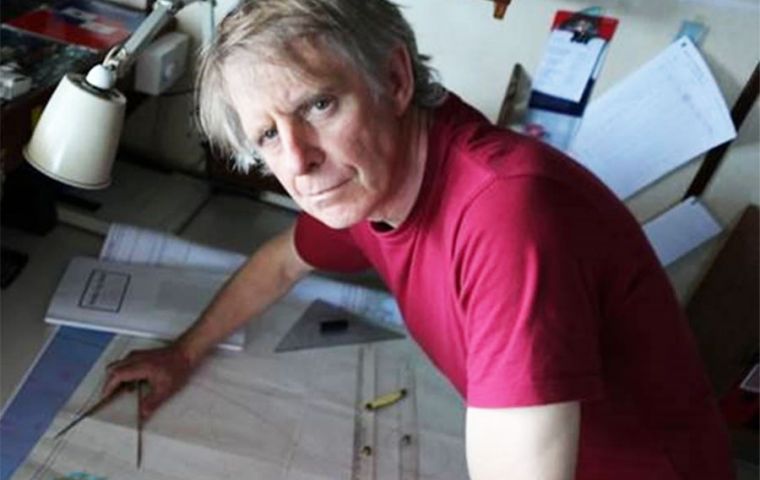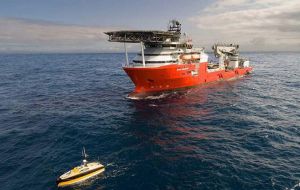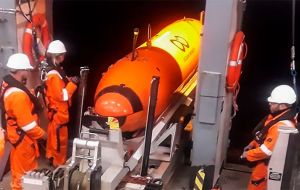MercoPress. South Atlantic News Agency
The Falkland Islander that helped search for the Argentine submarine ARA San Juan
 Falklands born and raised marine archeologist Mensun Bound (Pic ABC.es)
Falklands born and raised marine archeologist Mensun Bound (Pic ABC.es)  The Seabed Constructor and its state of the art technology were successful in discovering the remains of the Argentine submarine
The Seabed Constructor and its state of the art technology were successful in discovering the remains of the Argentine submarine  One of the Autonomous Underwater Vehicles, AUVs, with foremost deep-ocean search capability in the world
One of the Autonomous Underwater Vehicles, AUVs, with foremost deep-ocean search capability in the world Everybody is aware of the recent hunt for the lost Argentine submarine San Juan, but what only a few know is that Falkland maritime archaeologist Mensun Bound was one of the team on board the Seabed Constructor, the ship that conducted the search.
Penguin News caught up with Mensun in the Indian Ocean where he was working on a site that was much deeper than even the Titanic.
We asked how one goes about finding a lost submarine.
Mensun explained that the search was conducted by a fleet of Autonomous Underwater Vehicles, or AUVs, that are owned and operated by Ocean Infinity, the company with the foremost deep-ocean search capability in the world.
The AUVs are each fitted with an array of scanning devices and, when they return to the ship after their 3-day missions, the data they have gathered is downloaded and then converted into a legible format which can be scrutinized by the analysts for anomalies. Any points-of-interest are then examined in real time by advanced camera systems fitted to the ship’s Remote Operated Vehicles, or ROVs.
When asked if the Argentine authorities knew there was a Falkland Islander on board he said he thought not.
“It was decided early on that the matter of my nationality would not be raised as this was a very sensitive mission and nobody, least of all me, wanted any political distractions. But, if I was asked, it was decided I would be open about it - but nobody asked.”
“In any case,” he continued, “we were in international waters so where any of us came from, strictly speaking, was not a matter of any significance. This was absolutely not a moment for politics.
There was, of course, a financial agreement between the company and the Argentine government but all of us on board saw it as a humanitarian mission. A lot of people died in horrific circumstances which, from one day to the next, plunged their families into life-sapping grief, mothers and fathers, sons and daughters, brothers and sisters, husbands …
“We had representatives of the families on board with us and when you sat beside them to eat every day, or spent hours in the mission-control rooms with them watching the seabed, you got to know them very well indeed. One man had lost a son who was the same age as one of my sons.
You could not help but be moved when he talked of his loss. With the Seabed Constructor we had by far the best deep-ocean search and- survey ship in the world and all we wanted to do – indeed it almost felt like a duty – was to find that submarine and bring some relief to the families. Nothing else mattered – certainly not politics. I have never known a project with such a sense of purpose.”
When asked about his most memorable moment, Mensun recalled a day in August when they were crossing the Falklands Bank north-east of the Islands and spotted something unusual on the seabed.
When they went down to investigate they found a massive, stone, doughnut-like feature with a perfectly smooth surface that at one time must have been a vent. He added that before leaving they used the vehicle’s manipulating arm to pick up a rock sample for the Falklands Museum.
Mensun said that during the search for the submarine the Falklands were never far from his thoughts as they were frequently swarmed by black-browed albatross which he knew came from the Jasons, West Point and New Island. One day on the bridge, out of curiosity he dropped a line on the ECDIS to see exactly where he was in relation to the Falklands and found the search area was precisely 300 miles due north of Saunders, an Island which had once been managed by his grandfather.
We asked what he was doing next. He replied that, in January and February of this year, he and a carefully selected team of specialists would be conducting a search for Shackleton’s Endurance, 3000m below the ice of the Weddell Sea.
Recently elected a Fellow of the Explorer’s Club in New York, Mensun has been given the honour of carrying the Club’s flag on the mission.
Finally PN asked if there were any plans to resume the hunt for the lost German fleet from the Battle of the Falklands. He replied that they hoped sometime this year to pick up where they left off in 2015. (Penguin News)




Top Comments
Disclaimer & comment rulesCommenting for this story is now closed.
If you have a Facebook account, become a fan and comment on our Facebook Page!